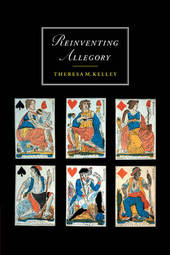
|
Reinventing Allegory
Paperback / softback
Main Details
| Title |
Reinventing Allegory
|
| Authors and Contributors |
By (author) Theresa M. Kelley
|
| Series | Cambridge Studies in Romanticism |
|---|
| Physical Properties |
| Format:Paperback / softback | | Pages:364 | | Dimensions(mm): Height 229,Width 152 |
|
| Category/Genre | Literary studies - general |
|---|
| ISBN/Barcode |
9780521157773
|
| Classifications | Dewey:820.915 |
|---|
| Audience | | Postgraduate, Research & Scholarly | |
|---|
| Illustrations |
Worked examples or Exercises
|
|
Publishing Details |
| Publisher |
Cambridge University Press
|
| Imprint |
Cambridge University Press
|
| Publication Date |
9 December 2010 |
| Publication Country |
United Kingdom
|
Description
First published in 1997, Reinventing Allegory asks how and why allegory has survived as a literary mode from the late Renaissance to the postmodern present. Three chapters on Romanticism, including one on the painter J. M. W. Turner, present this era as the pivotal moment in allegory's modern survival. Other chapters describe larger historical and philosophical contexts, including classical rhetoric and Spenser, Milton and seventeenth-century rhetoric, Neoclassical distrust of allegory, and recent theory and metafiction. By using a series of key historical moments to define the special character of modern allegory, this study offers an important framework for assessing allegory's role in contemporary literary culture.
ReviewsReview of the hardback: 'A learned and ambitious study ... a powerful achievement ... On every page, Kelley's meticulous, subtle close readings engage in, rather than simply demonstrate, the demanding dialectical work of allegorical figuration ... For decades to come - and for readers well beyond the field of Romanticism - it will be a touchstone for all critical discussion of allegory, modernity, and much else besides.' Romantic Circles Review of the hardback: 'Readers concerned with this still crucial element of literary and artistic practice will find a great deal within this book which is stimulating, original and worthy of further investigation.' Romanticism
|